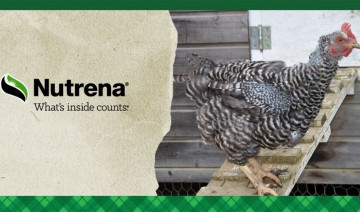
Amino Acids: Helping Your Flock Through Molt
Jennifer Murtoff, Home to Roost LLC
You may have seen the words amino acids on labels of human dietary supplements that claim to build healthy muscle, lower blood sugar, or improve skin condition. What are amino acids, and why are they also important for your chickens?
What are Amino Acids?
You may remember from science class that amino acids are the building blocks of proteins.

They consist of about 20 different organic compounds that combine in chains to form complex proteins. These proteins, in turn, perform essential roles in living things. They form the cells of our bodies, transport materials to and from cells, help us move, protect us from disease, and determine the activity of our genes. Proteins and amino acids are essential to life itself.
There are two kinds of amino acids:
- Nonessential amino acids are produced by the body and do not need to be part of the diet.
- Essential amino acids, however, cannot be made by the body and have to come from food. These amino acids include histidine, isoleucine, leucine, lysine, methionine, phenylalanine, threonine, tryptophan, and valine.
Of the essential amino acids, lysine and methionine play a vital role in feather growth. We’ll be looking at those in detail later.
Importance of Amino Acids During Molt
Chickens will generally begin to molt, or lose and regrow their feathers, in the fall. This is a

natural process that begins after a chicken reaches the age of about 18 months. Old feathers drop out, new feathers grow in, and the whole process usually takes anywhere from 4 weeks to 4 months. Molting allows chickens to replenish worn-out feathers and ensure they have a warm, protective coat before the cold weather comes. During this time, egg laying will slow down or cease altogether.
Chicken feathers are about 85% protein, so chickens need extra protein in their diet during this time to support healthy feather regrowth. Because amino acids are the building blocks of proteins, it is important to ensure your birds receive the right amino acids in their feed.
Amino Acids in Feeds
Your birds need a high-quality diet with sufficient proteins (16% to 18%) and amino acids

during molt. During the molt, you should eliminate scratch grains from their diet; this provides primarily calories with limited nutritional value.
The bulk of the necessary amino acids in feeds come from the protein in the feed; however, a quality feed will contain two additional essential amino acids.
- Lysine: The amino acid lysine is vital for overall growth, optimal digestion and use of feed, and balanced nutrition.
- Methionine: Methionine is necessary for the development of the digestive tract, overall growth, feather development, and immune system performance.
NOTE: It is possible to have too much lysine/methionine in poultry diets, which leads the birds to eat less. Choose a commercial feed that is balanced to meet your flock’s needs.
Healthy Skin Helps Feather Regrowth
The health of a chicken’s skin also affects feather regrowth. Feather Fixer provides a combination of increased protein and fat levels along with chelated trace minerals to keep the skin healthy.
As soon as your birds show signs of molting, switch them to a commercial feed like Naturewise® Feather Fixer, formulated specifically for feather regrowth, to ensure they receive the amino acids and other nutrients they need to support healthy feather regrowth and get them back to laying.
As you consider your feed choices, think about amino acids and the needs of your birds. Naturewise® Layer and Feather Fixer provide all the nutrients your chickens require to live their best lives with optimal health, whether or not they are molting!
The feed room is proudly brought to you by Nutrena and Cargill Animal Nutrition. Learn more about us here. You can see the original blog post here.
